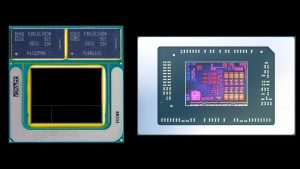Back in August 2022, chip design firm Arm filed a lawsuit in the US against Qualcomm, demanding that it destroy specific Arm-based technologies. With no progress made in the case, Qualcomm went on to use said technologies in its Snapdragon X processors, the only chips currently rated for use in Microsoft’s new Copilot+ AI PCs. Given how much the PC industry is hoping AI will revive a somewhat flagged market, will this ongoing legal battle ultimately stop the AI PC from ever becoming successful?
According to a report by Reuters (via Heise), this question was frequently being discussed among attendees at Computex 2024. The whole situation started to form when Qualcomm acquired Nuvia, a start-up company developing server CPUs, back in 2021.
That company had licenced processor architectures from Arm and once it became part of Qualcomm, the work development of the work carried on. Ultimately, Nuvia’s designs were used in various high-end processors, including the Snapdragon X range.
However, in August 2022, Arm filed a lawsuit in the US District Court of Delaware, claiming that Qualcomm had no right to do so, because the moment Nuvia officially became part of Qualcomm, the former’s Arm licences expired.
By using Nuvia’s chip designs, Qualcomm was in breach of contract, according to the lawsuit, and as restitution, Arm demanded that Qualcomm must destroy any technologies developed using Nuvia’s old licences.
Since that time, no progress has been made in the legal battle, and because it remains hanging over Qualcomm, the PC industry is rather concerned that it could derail the expected boom in laptop sales. That’s because the star of the Copilot+ AI PC show is Qualcomm’s Snapdragon X processor, which uses a version of Nuvia’s CPU design, as it’s currently the only chip that’s ratified for use in Microsoft’s AI PC ecosystem.
Qualcomm’s position on the matter is that it believes that it “has broad, well-established license rights covering [its] custom-designed CPUs”, according to a report by Reuters, which is why there’s been no agreement of any kind made between the two companies.
A significant number of major laptop vendors (Dell, Asus, Acer, MSI, and Gigabyte) have gone ahead with developing Snapdragon X-powered laptops and many are already available on retail shelves. Could a final push by Arm force the sale of these PCs to be halted or even stopped for good?
(Image credit: Future)
Best CPU for gaming: The top chips from Intel and AMD.
Best gaming motherboard: The right boards.
Best graphics card: Your perfect pixel-pusher awaits.
Best SSD for gaming: Get into the game ahead of the rest.
I don’t think that will happen because so much capital has already been invested in the Windows on Arm and Copilot+ ecosystems, a successful outcome for Arm in the legal battle would probably initiate a swathe of fresh lawsuits against it from the likes of Microsoft, Dell, Asus, and so on. And it would also put off any company from wanting to use Arm in the PC industry for a long time.
The most likely outcome of the lawsuit is that Arm and Qualcomm eventually settle out of court, with the latter paying the former a healthy sum of money or a larger slice of the profits made by the Snapdragon X range.
But until there’s a concrete conclusion to the two-year licencing battle, the new wave of AI PCs might find itself coming ashore in a gentle splash, rather than the impressive crash that PC vendors are hoping for.












